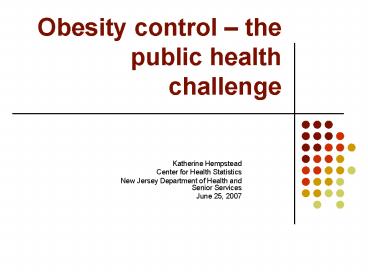Obesity control the public health challenge - PowerPoint PPT Presentation
1 / 26
Title:
Obesity control the public health challenge
Description:
Obesity control the public health challenge. Katherine Hempstead. Center for Health Statistics ... 1. Understand epidemiological data on obesity epidemic ... – PowerPoint PPT presentation
Number of Views:219
Avg rating:3.0/5.0
Title: Obesity control the public health challenge
1
Obesity control the public health challenge
- Katherine Hempstead
- Center for Health Statistics
- New Jersey Department of Health and Senior
Services - June 25, 2007
2
Learning objectives
- 1. Understand epidemiological data on obesity
epidemic - 2. Review current obesity control policy
activities - 3. Understand challenges facing obesity control
efforts, role of epidemiologists
3
Overview
- Background
- Current policy activities
- Obesity control vs. tobacco control
- Outlook/Assessment
4
Age pattern of obesity prevalence, 1998-2006
Source BRFSS
5
If age-specific growth rates persist
Projection 2012
Source BRFSS
6
Prevalence of overweight Children and teens
SourceNHANES
7
Obesity Trends Among U.S. AdultsBRFSS, 2005
(BMI 30, or 30 lbs overweight for 5 4
person)
1519
2024 2529 30
8
Overweight and obesity by race and ethnicity,
adults, 2006
Source BRFSS
9
Overweight by race and ethnicity, 12-19 years,
2003/4
SourceNHANES
10
Burden of obesity
- Morbidity
- Disability
- Life expectancy
- Cost
11
Public health response
- Long recognized as health problem
- Epidemic anticipated since 1970s
- Focus has been on individual behavior
- if overweight, decrease energy intake and
increase energy expenditure Dietary Goals for
the United States, 1977
12
More recently
- Obesity is a societal problem
- The toxic environment
- Policy focused on altering environment
- individual change will not work in isolation.
- Trust for Americas Health, 2006
13
Recent legislative activities
- Schools
- Task forces
- Insurance mandates
- Taxes/bans on food
- Menu labeling
- Improvements to the built environment
14
Enacted obesity legislation
15
Proposed obesity legislation
16
2006 State Report Card
17
Obesity control comparable to tobacco control in
some ways
- Multiple stakeholders
- States very important
- Focus on prevention
- Focus on environmental reform
- Emphasis on legislative activity
18
Tobacco control hailed as a great public health
victory
- Obesity control efforts in much earlier stage of
development - Is obesity control on a trajectory to be
similarly successful? - Unique challenges
19
1. Obesity is a more complex problem
- Food behavior affected by many factors
- Physical activity difficult to regulate
20
2. Food supply more difficult to regulate
- Food supply is decentralized
- Food industry less monolithic
21
3. More potential for backlash
- War on obesity or war on obese?
- Some say too much big brother
22
Summary
- Challenges
- Complexity of obesity
- Decentralization of food supply
- Potential for backlash
- What do we need?
23
We need epidemiological evidence
- Public intervention on the rise
- But science not driving policy
- Epidemiologists can contribute with data,
evaluations, new outcome measures - a necessary element of an adequate
governmental response to the obesity epidemic is
a robust information-gathering system to monitor
progress and guide programs and policies. IOM
24
and appropriate expectations
- Avoid urge to rush into unsupported activities
- Toxic environment was created over several
decades - Consumers need to develop new lifestyle
preferences and maintain them - Need to de-normalize unhealthy lifestyles
- Moderate change may confer benefits
25
The problem is pervasive
26
In closing
- The 'fad diet' approach does not work for
individuals, and it's not going to work for our
nation's obesity crisis either. - Trust for Americas Health, 2006































